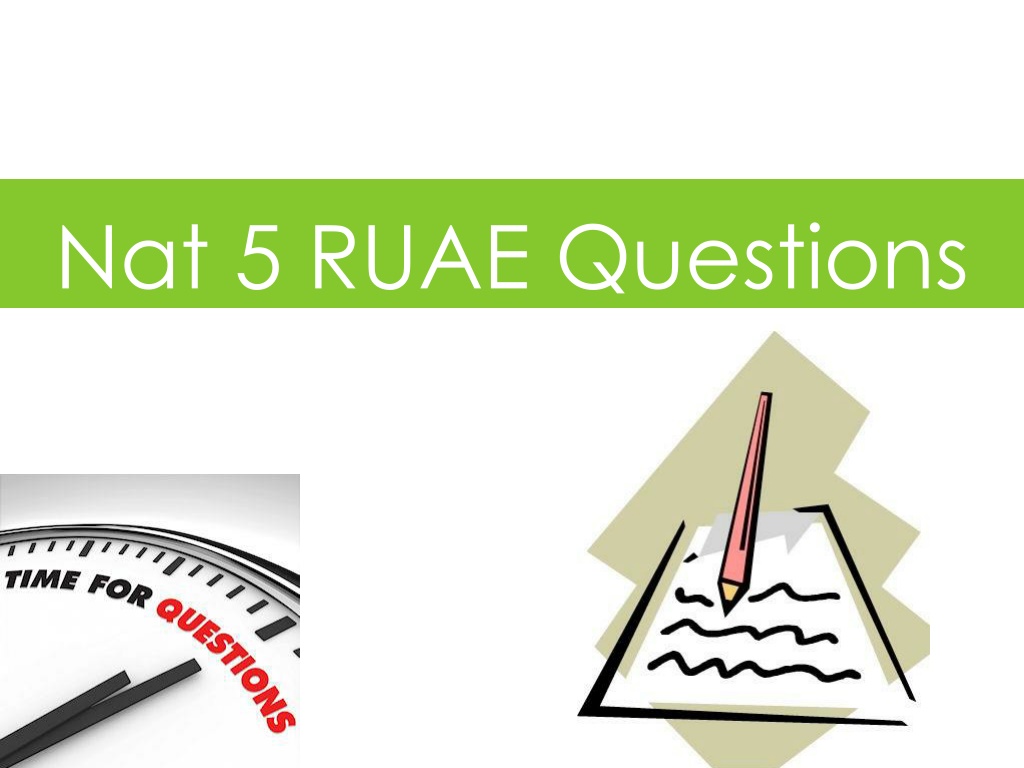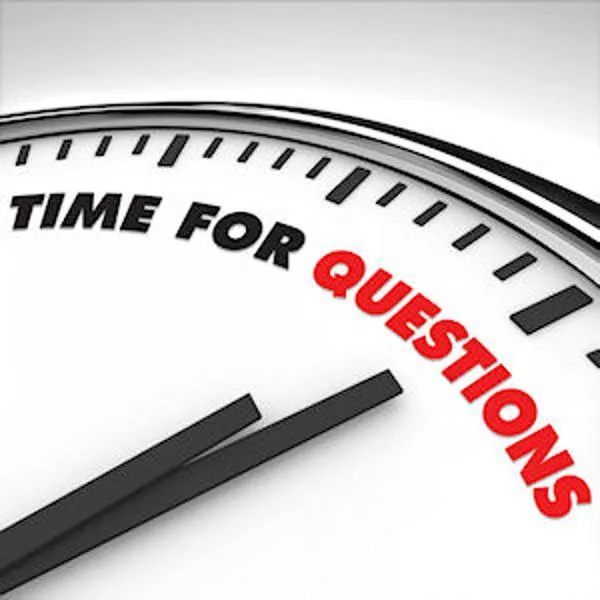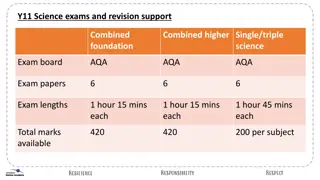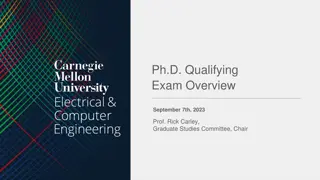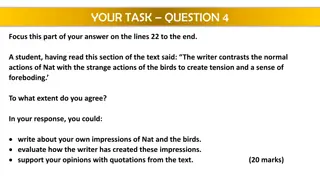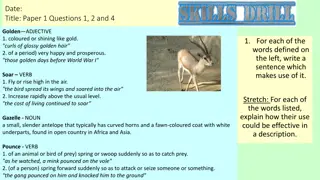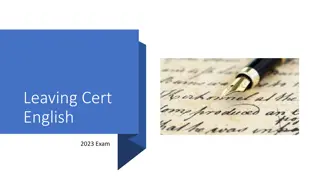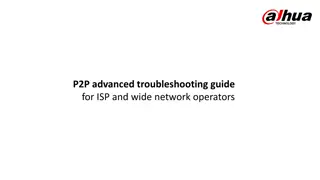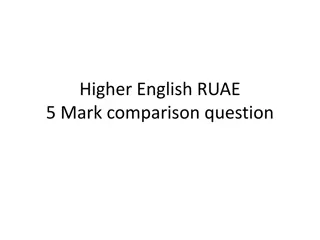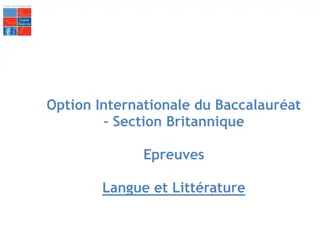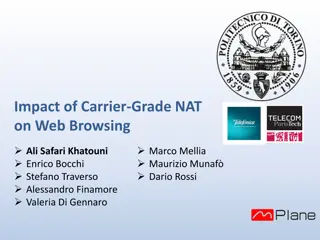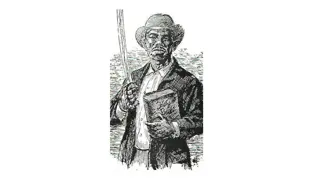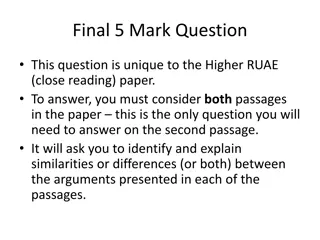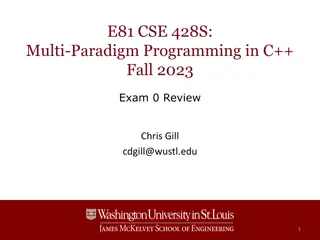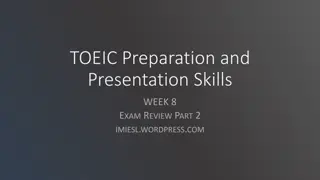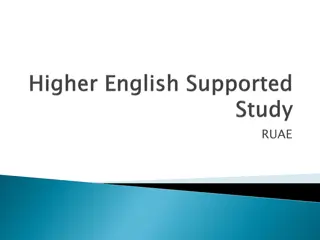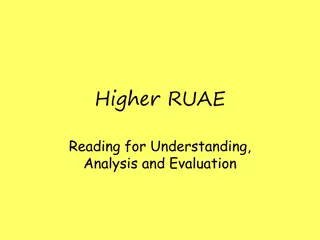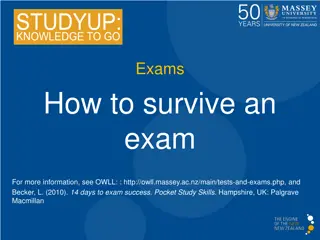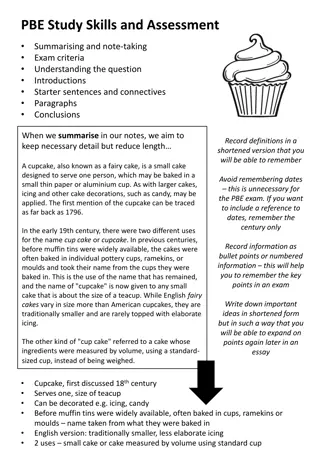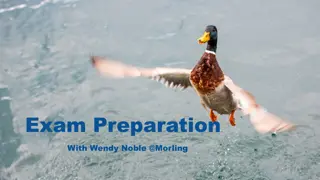Effective Language Techniques in RUAE for Nat.5 Exam
Understand how to rephrase information in your own words for the Reading for Understanding, Analysis, and Evaluation (RUAE) section of the Nat.5 exam. Learn to analyze word choice, extract key characteristics, and practice examples to improve textual comprehension and response skills.
Download Presentation

Please find below an Image/Link to download the presentation.
The content on the website is provided AS IS for your information and personal use only. It may not be sold, licensed, or shared on other websites without obtaining consent from the author. Download presentation by click this link. If you encounter any issues during the download, it is possible that the publisher has removed the file from their server.
E N D
Presentation Transcript
In Your Own Words Understanding
What the examiner is looking for You must take information from the passage and turn it into your own words. Simple words from the passage can be used if there is no alternative. Figures of speech or slang must be changed into plain English. You must not lift whole phrases or sentences from the passage: these will not be awarded any marks.
Example Thinking of Grandpa now, I recall the clouds of pungent smoke that he puffed from his favourite briar, his small shrewd eyes, still very blue, and the gleaming dome rising from fleecy tufts of white hair. Q. What three characteristics of Grandpa does the author remember?
Answer She remembers her grandfather smoked a strong-smelling pipe. He also had intelligent bright blue eyes and a bald head with a little fluffy white hair. briar - pipe Now try the examples on the sheet given to you. gleaming dome - bald head shrewd - intelligent grandpa - grandfather
Word Choice Analysis
What is Word Choice? When we talk about word choice as a technique, we mean that certain words have been deliberately chosen to obtain particular effects or to suggest particular meanings. Denotations - actual meaning of the word Connotations - the ideas that a word suggests to us.
What the examiner is looking for 1. Quote the word. 2. Say what the connotations of that word are. 3. Explain how the connotations of the word help achieve a particular effect. NOTE: All WC questions ask you to comment on how a word does a specific thing. E.g. Comment on how the WC suggests/gives the impression/creates X. You must focus your answer around X. Don t just say what the word means on its own.
Examples Denotation Connotation Gobbled - desperate hunger, selfish greed, poor table manners. Gobbled - to consume food by putting it in your mouth. Nibbled - to consume food by putting it in your mouth. Nibbled - to eat delicately or nervously.
Example One Less Pig Perfect Justice. Shocking enough by itself as a slogan to all right thinking people, but half an hour after the tragic shooting of two female police officers? This is offensive enough to earn the wearer, Barry Thew, four months in jail. Some would have liked it to be longer. But this distasteful incident has sparked the debate over the rights we have in Britain when it comes to expressing our opinion. Q. Show how the writer s word choice indicates that she may agree with the sentence handed down to the criminal.
Answer One Less Pig Perfect Justice. Shocking enough by itself as a slogan to all right thinking people, but half an hour after the tragic shooting of two female police officers? This is offensive enough to earn the wearer, Barry Thew, four months in jail. Some would have liked it to be longer. But this distasteful incident has sparked the debate over the rights we have in Britain when it comes to expressing our opinion. tragic shows how devastating the situation was and therefore how extreme Thew s insult was. earn suggests the sentence was fully deserved, he deserved or intentionally asked for what he got. distasteful - shows the writer disapproves of what Thew did and suggests he had a lack of sympathy.
Linking Questions Understanding
What the examiner is looking for You have to show how one sentence provides a link in the passage. The link will join one idea to the next. The link sentence will often stand at the beginning of a paragraph. Usually the first part of the sentence refers back to the previous topic and another part of the sentence will introduce the new topic. Usually worth 2 marks - 1 for each identification of the part of the sentence and comment on the topic it links to.
Method - 4 parts 1 - Quote the part of the link sentence which links back to the earlier topic. 2 - State what the topic is that it links back to. 3 - Quote the part that links forward to the next topic. 4 - State what that next topic is. If the sentence begins with a word like but or however which points to a change in topic, you should highlight this too.
Example Around the world William Shakespeare is one of the best loved of all playwrights. Most people can name at least one of his plays, and lines from his work are ingrained into our psyche and language. However, despite our familiarity with his work, we know relatively little of the man himself. We do not know when or why he became an actor, we know nothing of his life in London, and almost nothing of his personal concerns. Q. Show how the third sentence acts as a link in the paragraph. (2 marks)
Answer The phrase our familiarity with his work looks back at the topic of how widely known Shakespeare s work is.(1 mark) The conjunction however which begins the sentence suggests a contrasting idea to follow. The second part of the sentence, we know relatively little of the man himself , introduces the new topic, namely the things that are not known about Shakespeare (1 mark), and a list of these follows this link sentence.
Sentence Structure Analysis
Types of sentence Statements - John is sitting down. - stating fact. Questions - Is John sitting down? - making the reader question something or if rhetorical, making it clear that no answer is required. Exclamations - John is sitting down! - used to convey a tone of amazement, shock or strong emotion. Command - Sit down, John. - used to persuade Minor/short sentences - used to create impact, suspense or urgency. Lists - used to emphasise the sheer amount of things.
Other things to look for Inversion - The change of word order. Flames leapt up and up. = Up and up leapt the flames. Used to alter the emphasis in a sentence Repetition - We shall fight on the beaches, we shall fight on the landing grounds, we shall fight in the fields and in the street, we shall fight in the hills. We shall never surrender. - highlights determination to never give up their efforts.
Punctuation A colon (:) usually introduces a quotation, a list or an explanation or expansion of the previous statement. A semi-colon (;) usually comes between two statements which are closely connected, or which balance or contrast one another. Often used in lists, instead of commas. A single dash (-) can be used to add an extra piece of information. It can also indicate the breaking off of a sentence or a pause in the sentence. Two dashes (-words here-) or parenthesis is used to add an extra piece of information which may not be considered too important.
What the examiner is looking for 1. Identify the feature of sentence structure. 2. Comment on the effect it has. Why has it been used? Depending on how many marks the question is worth, you must provide one feature/effect for each mark.
Example Fog everywhere. Fog up the river, where it flows among green airs and meadows; fog down the river, where it rolls defiled among the tiers of shipping, and the waterside pollutions of a great (and dirty) city. Fog on the Essex marshes, fog on the Kentish heights. Fog creeping into the cabooses of collier-brigs; fog lying out on the yards, and hovering in the rigging of great ships; fog drooping on the gunwales of barges and small boats. Q. Discuss the effectiveness of the sentence structure in this extract.
Imagery Questions Analysis Similes Metaphors
What the examiner is looking for To acquire all of the marks in an imagery question you must ask yourself: What is being compared to what? In what respects are the two similar? How does the comparison help you to visualise the subject better?
Example The lake was a silver mirror flawlessly reflecting the sky. Explain how effective you find this metaphor. (2 marks)
Other things to look for... Q. Comment on the effectiveness of... Alliteration - a series of words in which the same letter is repeated. Onomatopoeia - a word which imitates the sound it s describing. Hyperbole - deliberate over-exaggeration to emphasise the point.
Other things to look for... Litotes - deliberate understatement used to take emphasis off something Euphemism - a milder way of saying something unpleasant (e.g. He s passed away) Oxymoron - two opposites placed beside each other to emphasise the difference (e.g dark light, alone together, painfully beautiful...) Juxtaposition - placing side by side
Tone Analysis Serious or Humorous?
What the examiner is looking for 1 - Identify the tone. 2 - Quote the words or phrase which helped you work out the tone. 3 - How did this help you work out the tone? Did they use any techniques to do this? (metaphor, simile, hyperbole, repetition, word choice etc...)
Different kinds of tone Flippant - when the author is shows a careless/disrespectful attitude towards something which is normally taken seriously (e.g. some brass and stuff, up at the holy end). Conversational - when the writer is chatty and friendly, as if confiding in a friend. Ironic - when the author is saying the opposite of what they mean for either humorous effect or to express their feeling forcefully. Serious - used for serious purposes - usually uses formal, pompous or ponderous words.
Different kinds of tone Tongue-in-cheek- when the writer sounds serious but is actually poking fun at the subject. Satirical - when a writer is funny but in a more savage way - they hold up a subject to ridicule in order to attack it. Emotive - when the writer aims to stir up emotions in the reader by shocking, angering or disturbing them. This is done by using words or expressions expressing extreme emotions. Remember: A question on tone is asking you what the writer s choice of words reveals about his feelings or his attitude to his subject.
Example Nowhere else on the planet do footballers perform in front of vast crowds so full of bile, hatred and bigotry. I have yet to find another place on the planet where a sporting occasion includes a ritual of singing of some ditty celebrating a distant battle which took place 307 years ago. Explain how the writer feels towards the what happened at the Ranger/Celtic match. How does his tone help convey this? (4 marks)
Answer The writer uses an emotive tone here (1 mark). He clearly disapproves of the hostility at the football match and struggles to understand why they are behaving that way (1 mark). He uses repetition of on the planet to hint that they are the only people who act like that and should be able to control themselves (1 mark). This is also a hyperbole as the writer hasn t actually searched the whole planet but is singling them out (1 mark). The writer also uses emotive language to convey strong emotions like bile , hatred and bigotry . His choice of the word ditty also implies a sense of contempt. (1 mark)
